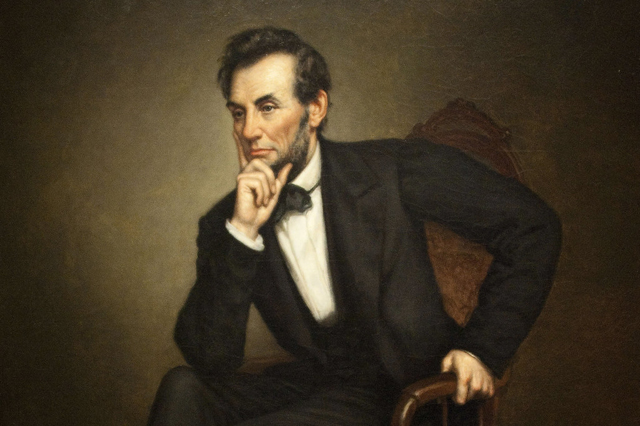
When Hollywood looks for subjects to create historical biopics on, the most compelling subjects usually end up being important world leaders spanning across history. For American films, the Presidents of the United States have often been given the cinematic treatment. From our founding fathers to the men and women who are still shaping our nation today, there are a fair amount of film dedicated to these important figures. But there probably hasn’t been an American icon that has appeared on both the big and small screens more than our 16th President, Abraham Lincoln. Lincoln was not a founding father, but his impact on our nation may have been even greater than that of the people who shaped it in the first place. And his story lends itself so well to cinema. Born and raised in the humble beginnings of a log cabin in the early American wilderness, Lincoln became a self made man who found his way into a law profession that in turn led to a career in politics, spurred by a passionate belief in the abolition of slavery. His eloquent speech and intelligent mind made him one of the great debaters of his day, and he carried the torch of abolition with him in a bid for the presidency, though it came at a volatile time for this nation. His election to president and promise of emancipation of the slaves was violently rejected by the southern states, all of which soon seceded from the Union and ignited the Civil War. But, Lincoln became a steadfast wartime leader and not only did he see the Union to victory over the Confederacy, but he also kept his promise of emancipation, ensuring the passage of the 13th Amendment in Congress, ending the barbaric practice of slavery once and for all in America. But it came at the cost of an assassin’s bullet, which prematurely ended Lincoln’s life, preventing him from seeing his achievements bear fruit in the years after the war. All of this history has made for some compelling cinematic moments, which is why Lincoln’s life story has been one of the most widely dramatized in all of cinema. What follows are some of his more noteworthy big screen appearances. Not only do they show the many ways that Lincoln continues to be a compelling figure in history, but it’s also interesting how the span of cinematic history itself shows different perspectives on the same man, showing the way history itself can be viewed differently over time.
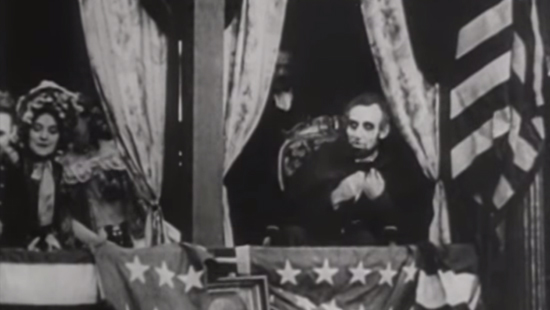
JOSEPH HENABERY in THE BIRTH OF A NATION (1915)
Unfortunately for Mr. Lincoln, one of his earliest big screen appearances comes in a movie that is antithetical to his legacy. D.W. Griffith’s monumental Civil War epic is one of the most influential and groundbreaking films in history; responsible for setting the precedents for so much of what we know as cinema in it’s wake. It is also Confederate apologia and a virulently racist film that was historically responsible for reviving interest in the Ku Klux Klan. Undeniably one of the most controversial films of all time, and it is still a lightning rod over a hundred years later. So, how does a film that spits in the face of everything that Lincoln stood for represent the man himself. Griffith, despite using his film to glorify the “lost cause” of the Confederacy and the KKK that arose out of it’s ashes, seems to also show a tiny bit of reverence for Lincoln himself, though it’s still very surface level at best. Griffith still understood the iconic nature of Lincoln in America’s historical legacy, and he presents him as this stoic, serious man who leads with a dignified air. The movie doesn’t tell us much more about the man; he’s barely a part of the main plot and is more or less just a background element on which the plot pivots. Joseph Henabery certainly looks the part, with the well-defined bearded chin and sunken eyes that we all know very well from Lincoln’s many portraits. It’s interesting to note that the movie itself was only 50 years separated from the life of Abraham Lincoln, which today would be the equivalent of us looking back on the Watergate era in politics. There might have been people who saw The Birth of a Nation during it’s original release who had also seen the real life Lincoln in person, which shows you how we are not too far removed from these historical events as we might think. Lincoln though should have deserved a better debut on the big screen than a horrific racist movie that the man himself would’ve likely condemned.
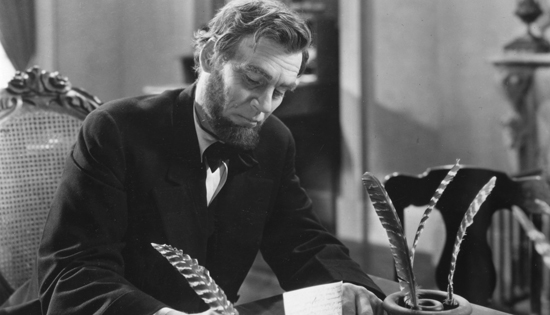
WALTER HUSTON in ABRAHAM LINCOLN (1930)
Fifteen years after The Birth of a Nation premiered, Griffith would try to atone for the hateful nature of his past epic with a movie devoted to telling the story of Lincoln himself. But, it was too little too late. While it is a far better movie than Nation for the simple factor that it doesn’t support the Confederacy and the KKK, Griffith still doesn’t create a compelling story around the life of Lincoln either. The movie is a speed run through the life of Abraham Lincoln, giving us an episodic look at all the touchstone moments in his life, from childhood to his presidency, to ultimately his assassination. But you know what Griffith conveniently leaves out; Lincoln’s abolitionist activism. The Emancipation Proclamation gets only a passing mention in the film, which is complete whitewash of history as ending slavery was the benchmark of Lincoln’s political career. In Griffith’s film, Lincoln is instead celebrated as the man who saved the country from division, which of course is an over-simplification of his accomplishments and his character. At least Griffith did a good job of casting the role. Renowned character actor Walter Huston (father of legendary filmmaker John Huston) is an ideal choice for the role, giving Lincoln an air of respectability, while at the same time making him relatable as down to earth leader of men. He also gets the look of the character right, very much capturing the stern faced man we all know from the photographs and the 5 dollar bill. But, as good as Huston’s performance is, he still can’t salvage the historical inaccuracies that plague the entire movie. While Griffith attempted to atone for the sins of The Birth of a Nation with this favorable portrait of Abraham Lincoln, one can’t help but see his own pre-built prejudices creeping in and still sanitizing the horrible racist legacy of the Confederate States by burying the reason the Civil War was fought in the first place. Abraham deserved a better film treatment than a hollow summary of the man’s life told by someone who was trying to use the film to whitewash his own toxic legacy in Hollywood.
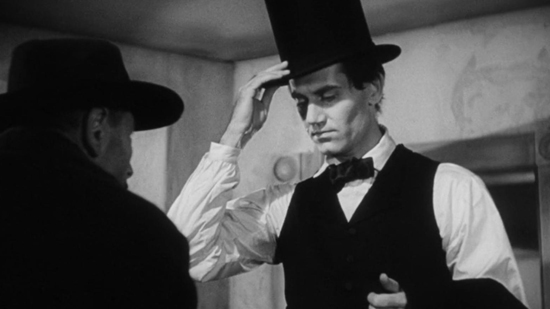
HENRY FONDA in YOUNG MR. LINCOLN (1939)
Finally, we get a portrayal of Abraham Lincoln that is true to the man’s legacy while at the same time is compelling as a great piece of cinema. Director John Ford wisely chooses to not tell the whole life’s story of Lincoln, and instead focuses on a specific period of time that informs us about the man who Lincoln was. As the title suggests, it’s a movie about Abraham’s early years, specifically the period of time in which he was practicing law in the town of Springfield, Illinois. In that period of time, we see Lincoln grow into the compassionate defender of the innocent that we know he’ll soon be in a racially and politically charged world that’s about to explode in the years ahead. It also covers his early love life, including his courtship with Ann Rutledge who sadly dies too soon and eventually leads him to his marriage to Mary Todd thereafter. Ford clearly has a reverence for Abraham Lincoln’s story, but he wisely refrains from making Lincoln too saint like. He managed to strike the right balance with the character of Lincoln by casting the perfect actor to play him; Henry Fonda. Fonda’s folksy everyman charm works perfectly with the character, and he perfectly captures the tender soul of Lincoln while also giving him the commanding presence of a man who will stand up for what is right. It’s the kind of performance that Fonda would continue to portray in most of his role over the rest of his career, including The Grapes of Wrath (1940) and 12 Angry Men (1957). While Young Mr. Lincoln was not his first role, it was certainly the movie that propelled him towards becoming an A-list movie star. The movie itself is also seen as a cinematic classic, and without a doubt one of the most beloved films centered around the story of the iconic American figure. After several films beforehand that either distorted or minimized the legacy of Mr. Lincoln, Young Mr. Lincoln was the movie that we really needed to help remind America the important and essential mark that he made on our nation.
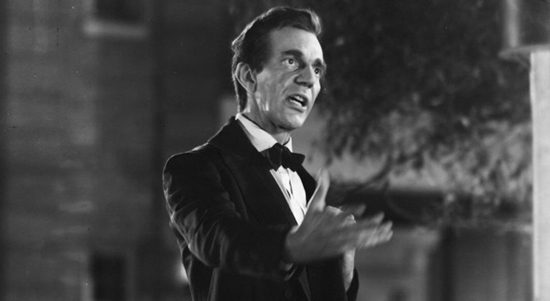
RAYMOND MASSEY in ABE LINCOLN IN ILLINOIS (1940)
Released the following year after Young Mr. Lincoln, this equally reverent portrayal of the man picks up right where the last movie left off. Henry Fonda’s portrayal of Lincoln showed us the young man just beginning to find his footing as a lawyer and discovering where his convictions lie. Abe Lincoln in Illinois takes us through the next stage, showing us how the lawyer became a politician and then ultimately the President of the United States. The movie is much more focused on showing us Lincoln the orator; the man who could inspire the people with his command of reason and intelligence. Actor Raymond Massey gives Lincoln a big booming voice, which definitely fits with the idea of Lincoln being a commanding speaker, especially in the film’s recreation of the famed Lincoln Douglas debates. Massey may not have the folksy innocence of Fonda’s portrayal, giving his version of Lincoln a more operatic presence, but he still treats the character with this respectable air. The movie also gives us perhaps the most historically accurate account of Lincoln’s life up this point. While Young Mr. Lincoln was true in spirit to the man, the movie itself was an imagined portrayal of what his early life might have been like. Abe Lincoln in Illinois stays very close to the actual events that shaped Lincoln into who he was, albeit with some typical Hollywood embellishment. Watchin the two movies together actually does work as a way of giving the viewer a fuller account of Lincoln’s life, each one complimenting the other. Given that so much is known about Lincoln’s time in office, it’s nice to see that two very strong older films were devoted to showing us the parts of his life that we know less of, which helps us to understand how he became the man who would guide our nation through it’s most perilous era.
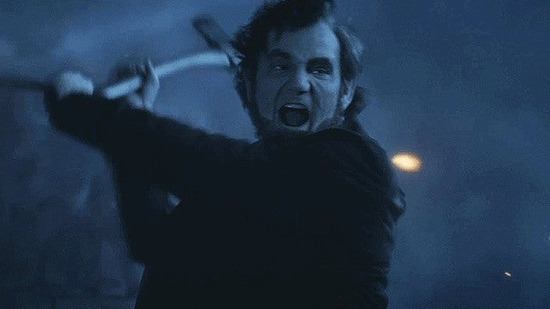
BENJAMIN WALKER in ABRAHAM LINCOLN: VAMPIRE HUNTER (2012)
Now, jumping ahead several decades, we go from some of the most honest, historically honest depictions of Abraham Lincoln to something that is just pure fantasy. Based on a history/fantasy mash-up novel by Seth Grahame-Smith, Abraham Lincoln: Vampire Hunter is exactly what the title infers; a story about the 16th president having an alternate career as a killer of vampires. This came out at around a time when these horror infused mash-ups were gaining popularity, which also included another Grahame-Smith novel titled Pride and Prejudice and Zombies, which itself was turned into a 2016 movie. The movie was directed by Russian filmmaker Timur Bekmambetov, who had gained popularity with his previous vampire flicks Nightwatch (2004) and Daywatch (2006). Seeing this foreign filmmaker deliver his own twisted spin on an American icon was going to be interesting to see, though the end result was unfortunately underwhelming. The movie never really lives up to the lunacy of it’s premise, and instead strangely tries to play things safe when it comes to the violence and the overall plot. The casting of Benjamin Walker was an interesting choice, given that he had gained fame on Broadway for portraying another American president in the musical Bloody Bloody Andrew Jackson. The statuesque Walker does create a physically imposing figure in Abraham Lincoln. Unfortunately, he doesn’t make Lincoln anything other than a stock action hero, which is not only a let down for the zany premise of the story, but also for the persona of Lincoln himself. It makes sense that Lincoln would be quite good at killing vampires with an axe, given that he was raised in the woods where tree-cutting was an essential skill. The movie should have been either far more scarier or far more absurd than the standard, boring action film we ended up with. It’s weird to say this about a movie where Abraham Lincoln is shown chopping up vampires with an axe, but Lincoln deserved better.
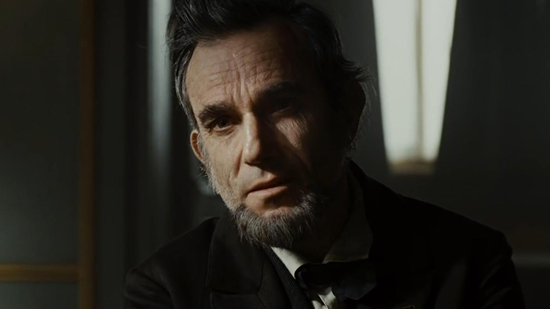
DANIEL DAY-LEWIS in LINCOLN (2012)
Of all the portrayals of Abraham Lincoln that have made it to the big screen, this is likely going to be the one that people will think of first. Irish actor Daniel Day-Lewis’ portrayal of the Lincoln in the 2012 film directed by Steven Spielberg may very well be the definitive one in all of cinema. It’s the only performance of Lincoln that has won it’s actor an Oscar (a third for Day-Lewis, making him the current reigning champ). Daniel took his method acting to the extreme and not only transformed himself into the persona of Abraham Lincoln, but also lived in his shoes throughout the filming of the movie. There was a great amount of effort in the actors part to get every detail of who Lincoln was on screen, with Daniel Day-Lewis even researching the tenor of voice that people who knew him described him as having. While we don’t know 100% for sure what the real life Abraham Lincoln sounded like, Daniel’s performance feel like it could be the closest that seen yet to being true to history. And while the Lincoln in this film is definitely at the heart of the story, the film is also about a specific period of time that was crucial to the shaping of America. The film centers on the passage of the 13th Amendment to the Constitution which banned slavery and the incredible maneuvering that Lincoln made as President to see it successfully pass through Congress, despite fierce opposition. It’s a textbook example of the right way to do a biopic of a historical figure, which is to center the story on a specific moment in their life and dramatize it to it’s fullest rather than condense an entire life into one 2 hour story. It makes for a more interesting and compelling story. And it gives us a more intimate look at Lincoln himself, as we see him struggle through the twists and turns of this very important moment in time. It’s also a great reversal of the early D.W. Griffith films that we have a movie that firmly establishes the Emancipation of the slaves across America to be Lincoln’s crowning achievement. Both Spielberg and screenwriter Tony Kushner create a compelling step by step dramatization about what it took to make Lincoln’s dream come true, and Daniel Day-Lewis brings the man to life in a way that feels like we’ve gone back in time to be in the presence of the real man himself.
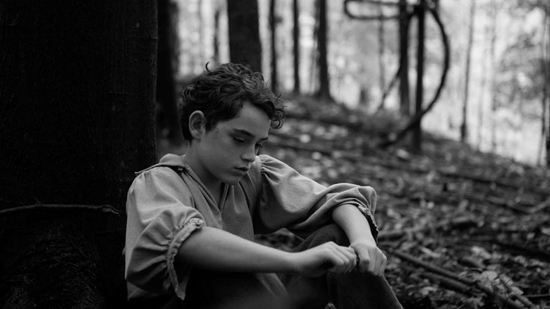
BRAYDON DENNEY in THE BETTER ANGELS (2014)
This film delivers a story about Abraham Lincoln unlike anything else we have seen in cinematic history. With a title taken from the famous quote delivered by Lincoln in his first Inaugural Address, The Better Angels takes us way back in history to show us the earliest part of Lincoln’s life, when he was still living with his family on their homestead in the Indiana wilderness. Here, Lincoln is a young man between the age of 9-10, discovering his identity and observing the sights and sounds that would motivate his future actions. The movie itself has a dream like atmosphere that is less plot driven and more like cinematic poetry akin to the films of Terence Malick. Not surprisingly, Malick was a producer on this film, with his frequent editor A.J. Edwards making his directorial debut with this film, and it’s clear that the influence trickled down. The film is also shot with some gorgeous looking black and white cinematography, which reinforces the film’s historic time capsule feel. At the center of the film is the portrayal of a very young Lincoln by actor Braydon Denney. Denney’s performance doesn’t reveal much of any indication of the man Lincoln would end up being. If you didn’t know going in that you are watching a movie about the early years of Abraham Lincoln, you would think that this was just another coming of age film, but with an artistic flair to it. Denney does well with his depiction of a young Abe. It’s a very grounded portrayal, and it helps to make him feel like a real person living in this historical time period. You don’t really learn much about Lincoln himself in this film; the movie is mostly just there to showcase what kind of life Lincoln must have had. As an artistic rendering on true history, it does create a provocative portrait of Lincoln’s upbringing. We know the least about this time period in Lincoln’s history, the only accounts being taken from Lincoln’s own autobiographical writings. We can only imagine what his early years may have been like through evidence of how people lived back then, and the movie does a fair job of that too. So many films about Lincoln use their time to build up his legend, but his film does the interesting action of using his own personal experience to inform us of the kind of life that would shape someone into a legend in the beginning.
These seven examples of Abraham Lincoln’s presence on the big screen are honestly just the tip of the iceberg when it comes to the many different appearances that he has made across all media. There are countless made-for-TV movies and miniseries that are either about Lincoln or include him as an important figure. He’s also shown up in several different films as a supporting player, including a silly cameo in the time travel comedy Bill and Ted’s Excellent Adventure (1989). Abraham Lincoln today still stands tall as one of our greatest historical icons, and is almost unanimously regarded as our greatest Commander in Chief. No other man achieved so much in his brief time as President of the United States. He secured the future of this country by commanding the nation through it’s greatest crises, the Civil War, and brought it to a worthwhile end by defeating the Confederacy and reuniting the sates. But of course his greatest legacy was getting the 13th Amendment passed and adopted into the Consitution, ending the barbarism of slavery in America once and for all, and emancipating the millions of slaves who were now free to live as equal citizens in American society. At least that was the hope, and sadly it would take nearly another century for equal rights to become enshrined into law, and even today the scars of slavery and the Jim Crow laws that followed still run deep in society. The good thing about movies that celebrate the life of Lincoln is that they remind us of the example of his leadership and how it still inspires us all to appeal to our “better angels” in society today. America still falls short of where it should be with regards to race relations, but the example that Lincoln left behind hopefully drives us to be better and to work to solve the problems of racial division that persist to this day. The best portrayals of Lincoln, from Henry Fonda’s tenderness to Daniel Day-Lewis’ intensity all have that inspiration in common. Far more than four score and seven years have we seen Lincoln be a guiding presence in our cinematic history, and hopefully he is a figure that continues to inspire future filmmakers and audiences in the years ahead.